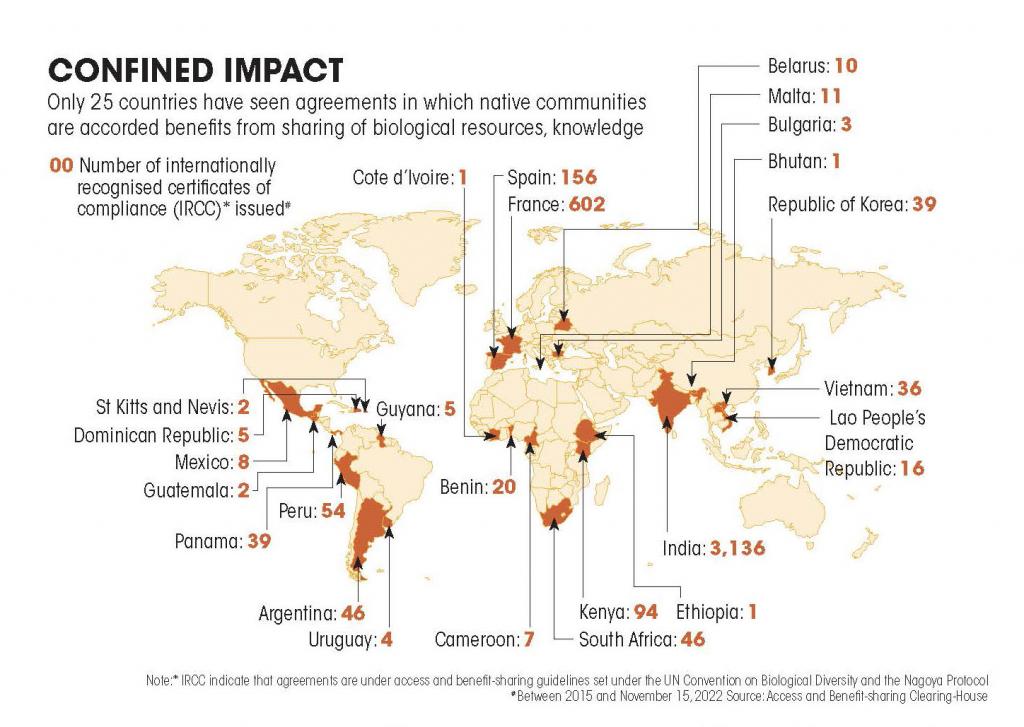

Nagoya Protocol sets clear mandates for potential users of genetic resources to obtain prior informed consent from the communities associated with the resource



Access and benefit-sharing (ABS) is a key objective of the UN Convention for Biological Diversity (CBD) and is set to be discussed at its upcoming 15th Conference of the Parties (COP15) to the Convention on Biological Diversity (CBD) in Montreal, Canada, from December 7-19, 2022.
CBD put in place the Nagoya Protocol in 2010 to ensure the effective implementation of this objective. The protocol sets clear mandates for potential users of genetic resources to obtain prior informed consent from the communities associated with the resource and negotiate mutually agreed terms for its utilisation.
Also read: Road to COP15: DTE’s coverage in the run-up to Montreal
However, Down To Earth’s analysis of such agreements, available with online platform ABS Clearing-House, indicates that these measures have not had a large-scale impact.
Only 25 countries have provided 4,344 internationally recognised certificates of compliance (IRCC) to access resources in accordance to CBD guidelines as of November 15, 2022.

These certificates indicate that agreements are in accordance with the Nagoya Protocol. The fact that a few countries have issued the certificates suggests that countries lack the capacity to deal with such requests.
Moreover, the pace at which the certificates are issued is tardy and inconsistent. The first IRCC was issued in 2015 by India. By the end of 2019, countries had issued 1,118 IRCCs.
Also read: Legal, controlled trade of wild species can have many benefits: CITES report
Over the next three years, despite the COVID-19 pandemic, issuance picked up — some 1,016 IRCCs were issued in 2020, 1,176 in 2021 and 1,034 in 2022 (till November 15).
There are no clear indications of the reasons behind this surge, but most IRCCs were issued by India.
The data also indicates that 1,281 of the overall 4,344 IRCCs are for commercial purposes and have been issued by 16 of the 25 countries.
The remaining are for non-commercial purposes like research (that do not benefit communities immediately or directly) or for purposes not indicated in the IRCCs (and hence their benefits remain unknown).
Also read: Over 10,000 to attend UN biodiversity convention next month
Africa, for instance, has issued only 169 IRCCs. All IRCCs of Kenya are for non-commercial agreements. South Africa, which began with commercial agreements, has now shifted to non-commercial agreements.
Similarly, the biodiversity-rich region of Latin America and the Caribbean has issued just 165 IRCCs. Peru leads the region, followed by Argentina and Panama.
Only four IRCCs in Peru are for commercial utilisation — for food plants cocoa and quinoa and medicinal plants maca and yacón — all issued in 2021-22.
In Argentina, all except two certificates (issued this year) are related to access for non-commercial purposes, while in Panama, only one certificate is for commercial purpose, issued in 2021. The platform does not provide details of transactions.
India leads the world in terms of ABS agreements with 3,136 IRCCs. The first certificate was issued in the country in October 2015 to a researcher at the University of Kent, UK, for accessing material to study the ethno-medicinal knowledge of the Siddi tribe in Gujarat.
Since then, the country has been issuing certificates as if in a frenzy: In 2022 alone, 800 certificates have already been issued, with 101 of them in the first 15 days of November.
Of the 3,136 certificates, 1,206 are for commercial use, 14 for both commercial and non-commercial purposes and 251 for non-commercial purposes. For the rest, the reason for access is not indicated on the website of the ABS Clearing-House.
This is the second of a four-part series on COP15 Montreal summit. It was first published in the Down To Earth print issue of 1-15 December, 2022
We are a voice to you; you have been a support to us. Together we build journalism that is independent, credible and fearless. You can further help us by making a donation. This will mean a lot for our ability to bring you news, perspectives and analysis from the ground so that we can make change together.

Comments are moderated and will be published only after the site moderator’s approval. Please use a genuine email ID and provide your name. Selected comments may also be used in the ‘Letters’ section of the Down To Earth print edition.